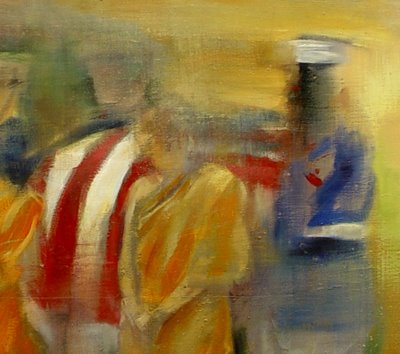Goya, Napoleon and Bush

" If the Princes of the world had to fight hand to hand,
goodbye to war.
But while there is someone in the world who can sacrifice
thousands of victims
how and when he pleases,
Without risk to his person,
enslaved humanity do not complain of his barbarity,
for the blame is yours."
-Giambattista Casti, "Gli animali parti" 1802

"Contemptuous of the Insults"
Goya 1816-1820
From: "A Revolutionary Age: Drawing in Europe, 1770–1820" organized by the Getty as a companion exhibition to the traveling exhibition
" Jacques-Louis David: Empire to Exile"
"Sometimes the most determined of invaders, equipped with strong armies and copious intelligence about its enemy can make myopic blunders that later seem close to madness"
Robert Hughes, from "Goya"- on Napoleon's invasion of Spain
Three years into our debacle in Iraq it is helpful to turn to art and history for some perspective. Napoleon invaded and occupied Spain from 1808 to 1813 prompting Goya's series of etchings, "The Disasters of War", and a related group of drawings . In the Getty's permanent collection is a small, ink wash drawing from this period depicting a modish, probably anti-monarchist Spaniard (note the outfit- no pretensions to court style). He mockingly doffs his hat to two miniaturized French soldiers while expressing disdain with his right hand in response to the soldier's insults. The Getty's notes to the exhibition point out Goya's anti-Napoleonic stance as evidenced in this drawing which illumines Spanish contempt for the Napoleonic forces laying waste to their country. The Spanish people resisted the French occupation with guerilla warfare (Robert Hughes points out in his study of Goya that this is the first use of the now familiar term to describe battle by irregular forces) and eventually defeated and expelled the French forces with the help of the English army.
One of the important points to bear in mind is the initial hope found by the Spanish middle class in the French Revolution and the possibilities inherent in a democratic society based on the Enlightenment with a separation between church and state. But Napoleon destroyed this goodwill through his own egoism and brutality. Invading someone else's home rarely endears one to the local population.
Robert Hughes explains, "For occupying forces used to the idea of war as a series of formal battles, it was exceedingly demoralizing to survive on territory where nearly everyone ... could strike at you from behind the trees and vanish back into them; where every civilian sleeve contained a knife."
While viewing Goya's drawing last year, I thought of our little-Napoleon and his misguided efforts to export democracy by force. His words from three years ago still ring hollow:
"Our nation enters this conflict reluctantly, yet our purpose is sure. The people of the United States and our friends and allies will not live at the mercy of an outlaw regime that threatens the peace with weapons of mass murder.
We will meet that threat now with our Army, Air Force, Navy, Coast Guard and Marines, so that we do not have to meet it later with armies of firefighters and police and doctors on the streets of our cities."
-George Bush March 19, 2003. From an address to the American people on the start of the war in Iraq. (Note the emphasis on weapons of mass murder and the not so subtle attempt to link Iraq with the September 11, 2001 attacks.)
Napoleon was kicked out but in many ways Spain was still defeated. The Spanish people continued to suffer under both a puffed up, penniless monarchy, to be followed by the brutality of Franco in the 20th Century, and a fear- driven, reactionary and provincial Spanish church. It was illegal in Spain until the 1970's to declare oneself anything but Christian. This sad coda to an earlier, misguided occupation does not bode well for the people of Iraq.
Note: This a lightly reworked piece from March 2005. I hope I will not have to post it again in March 2007.
Art

0 Comments:
Post a Comment
<< Home